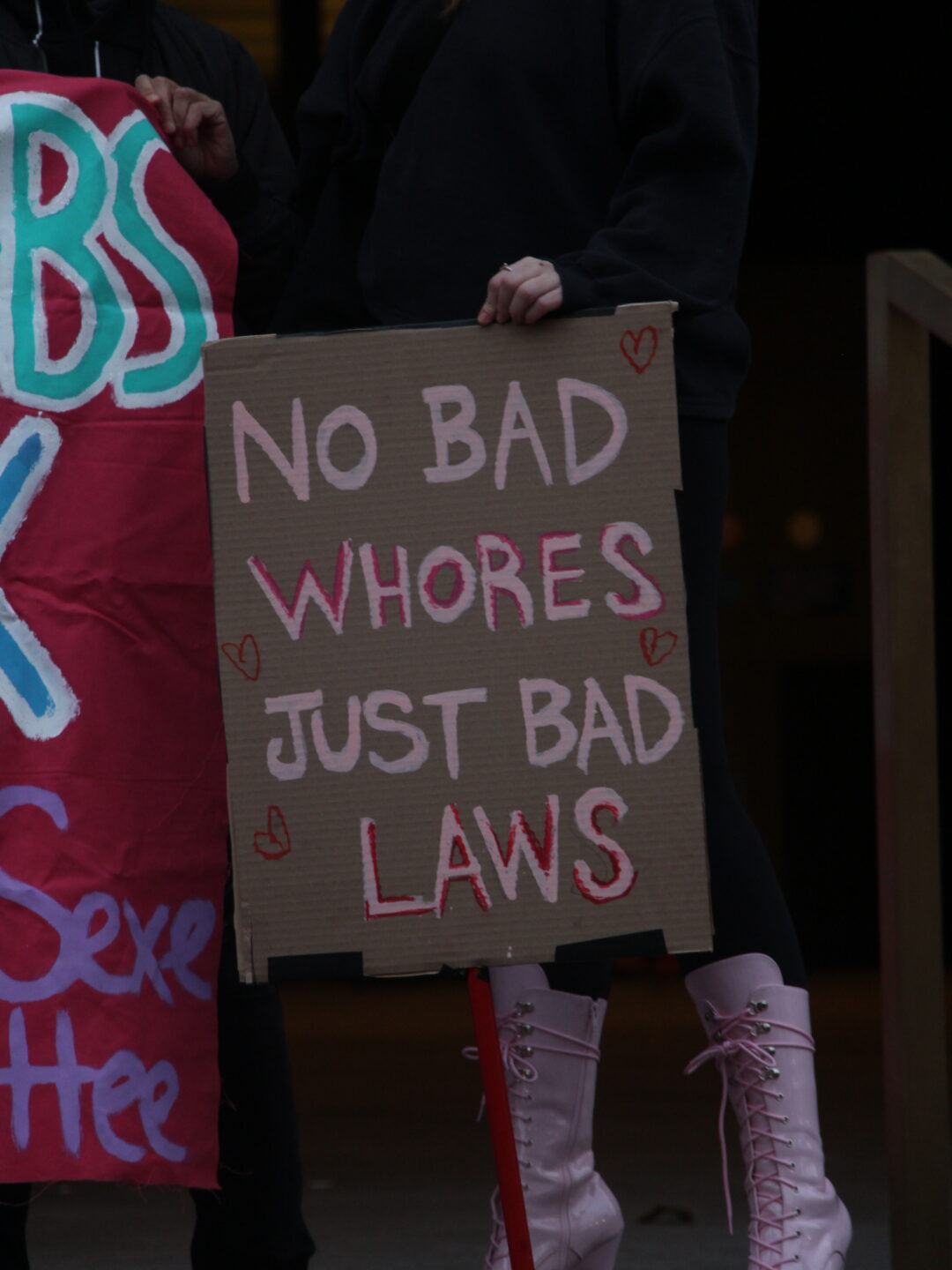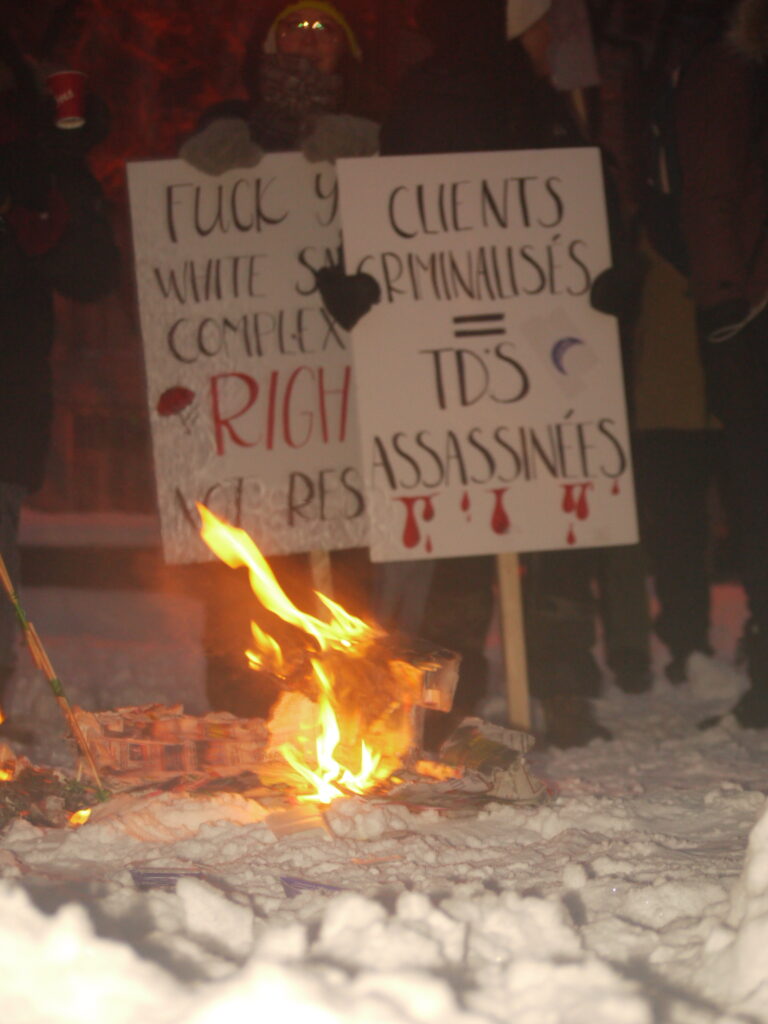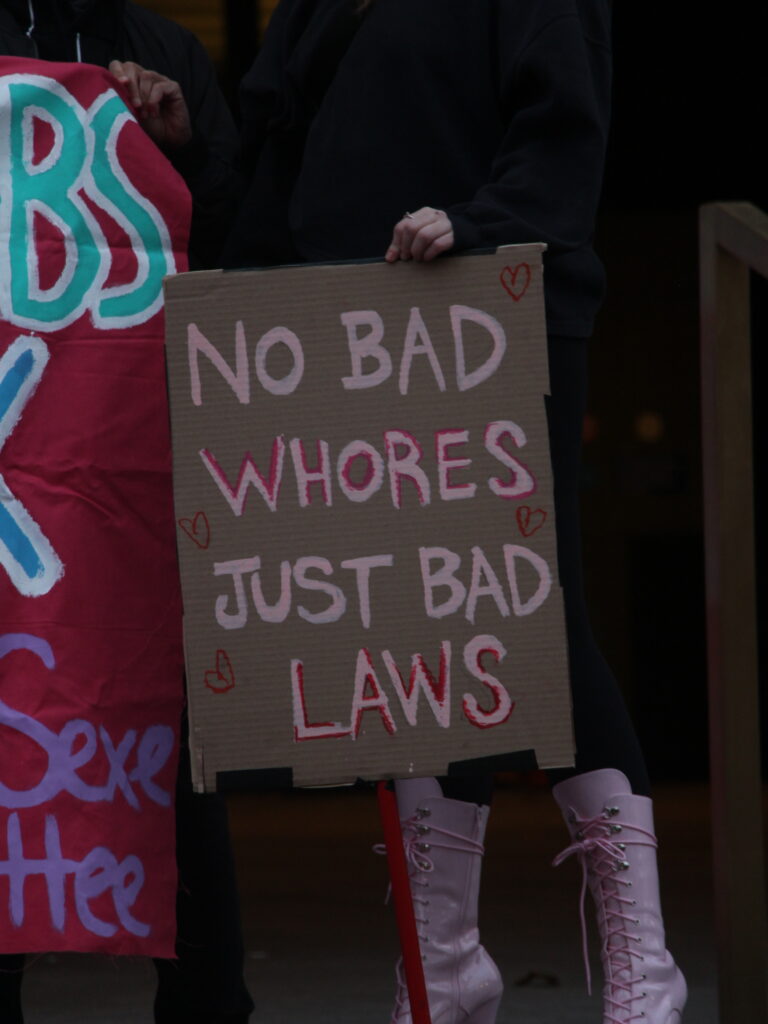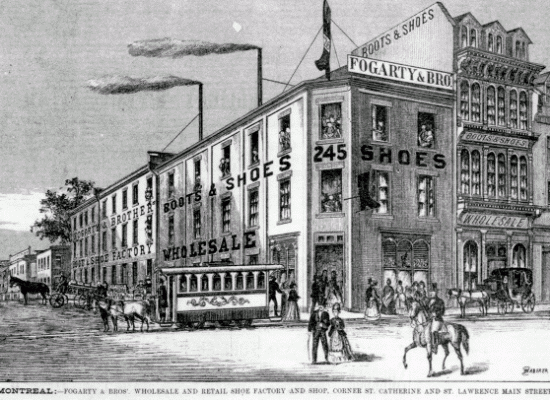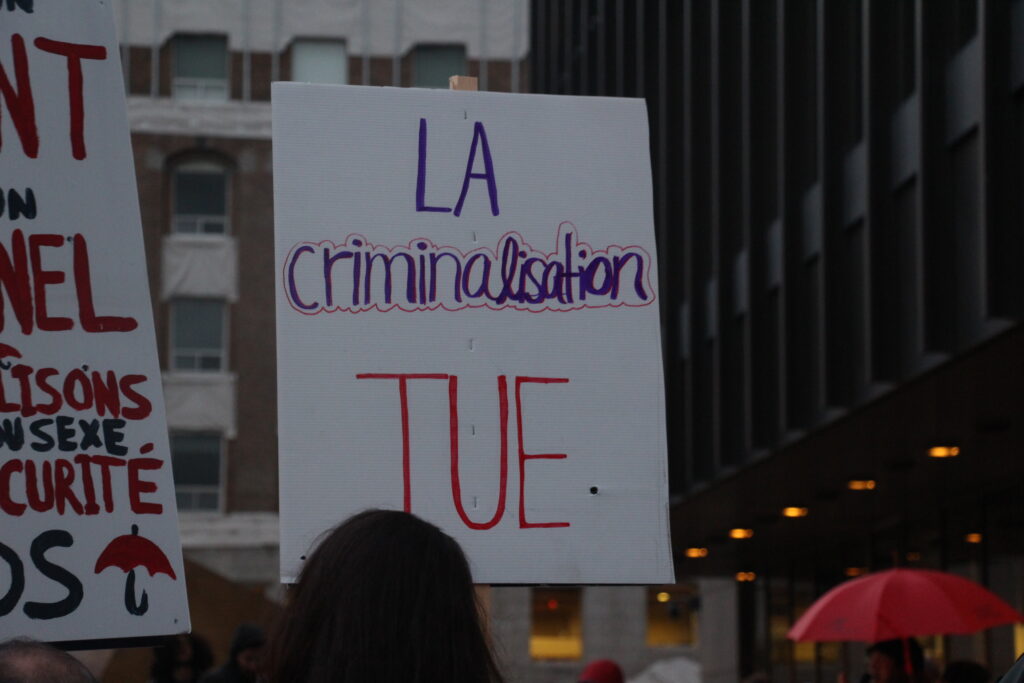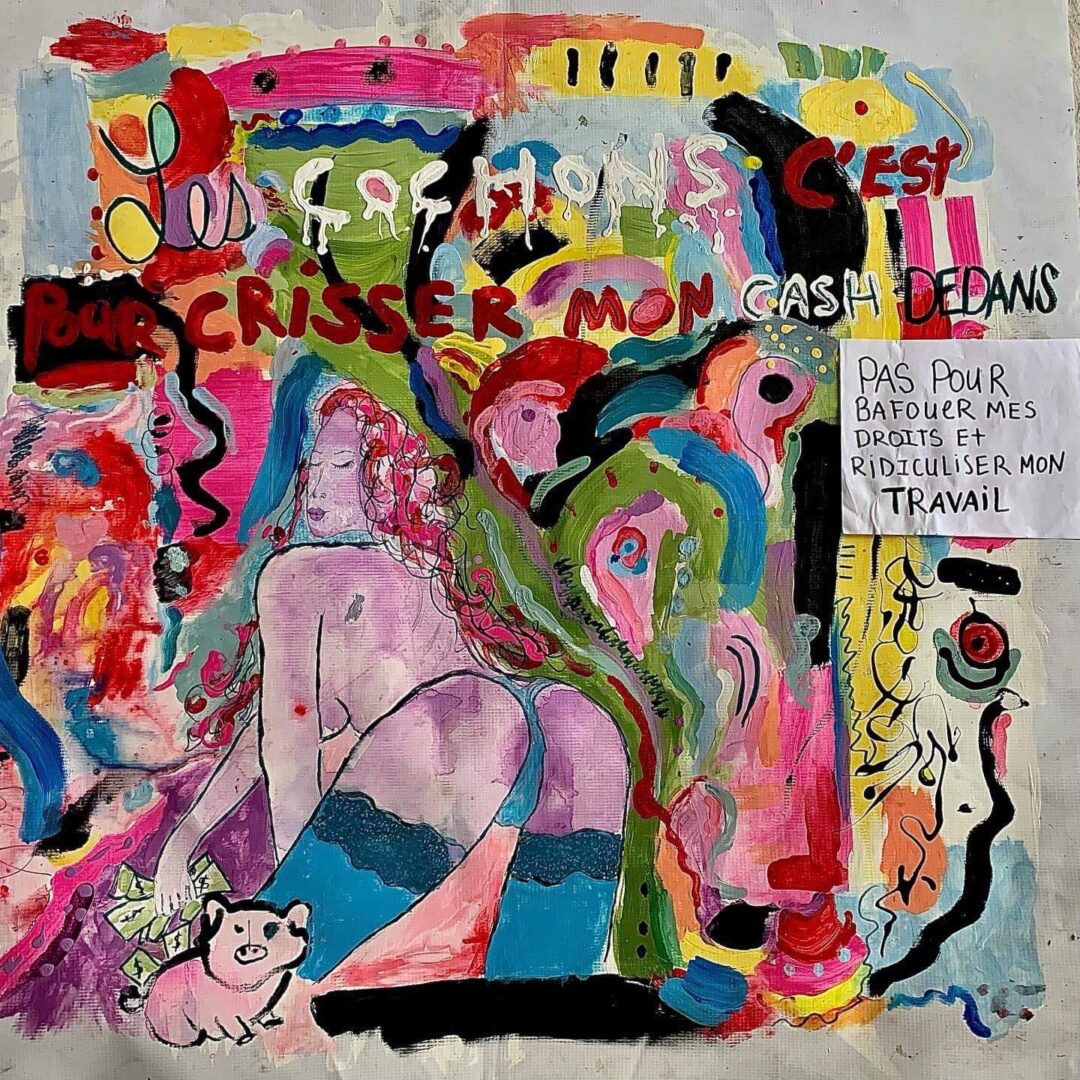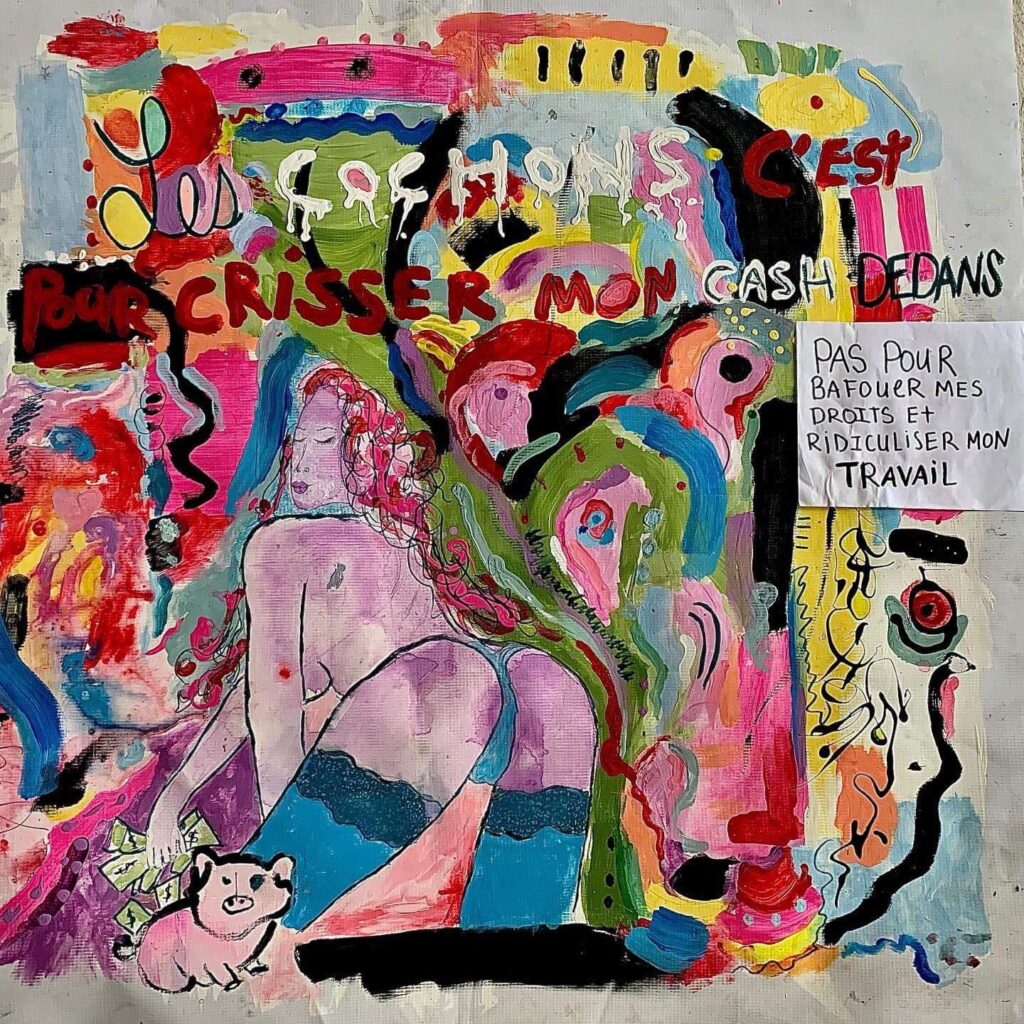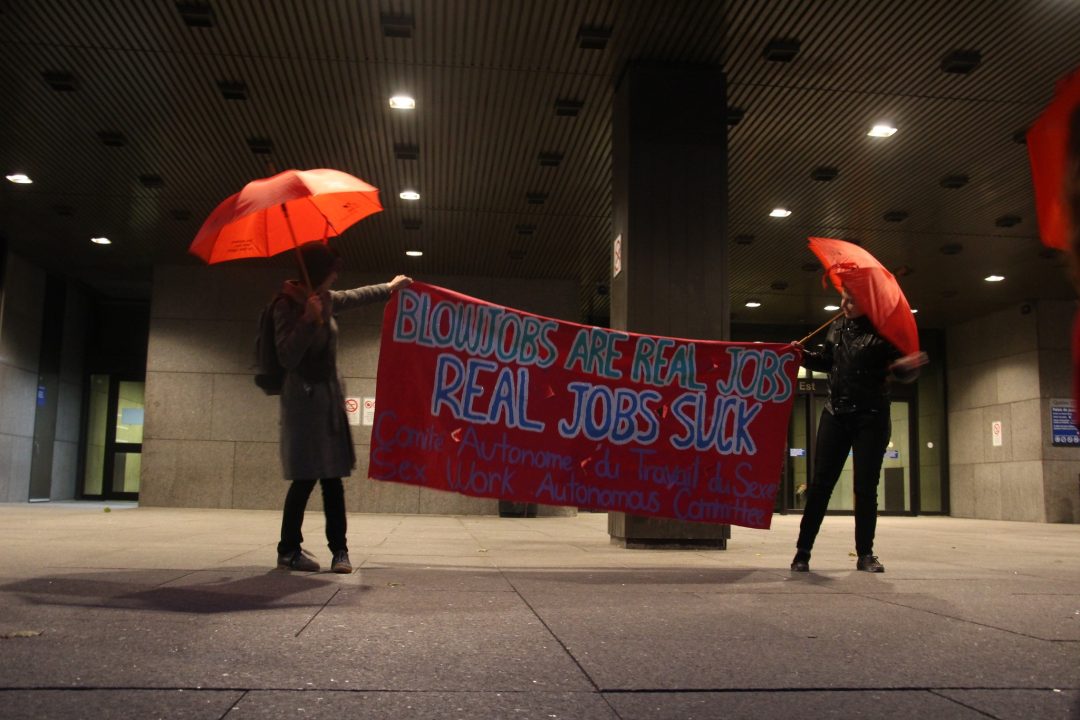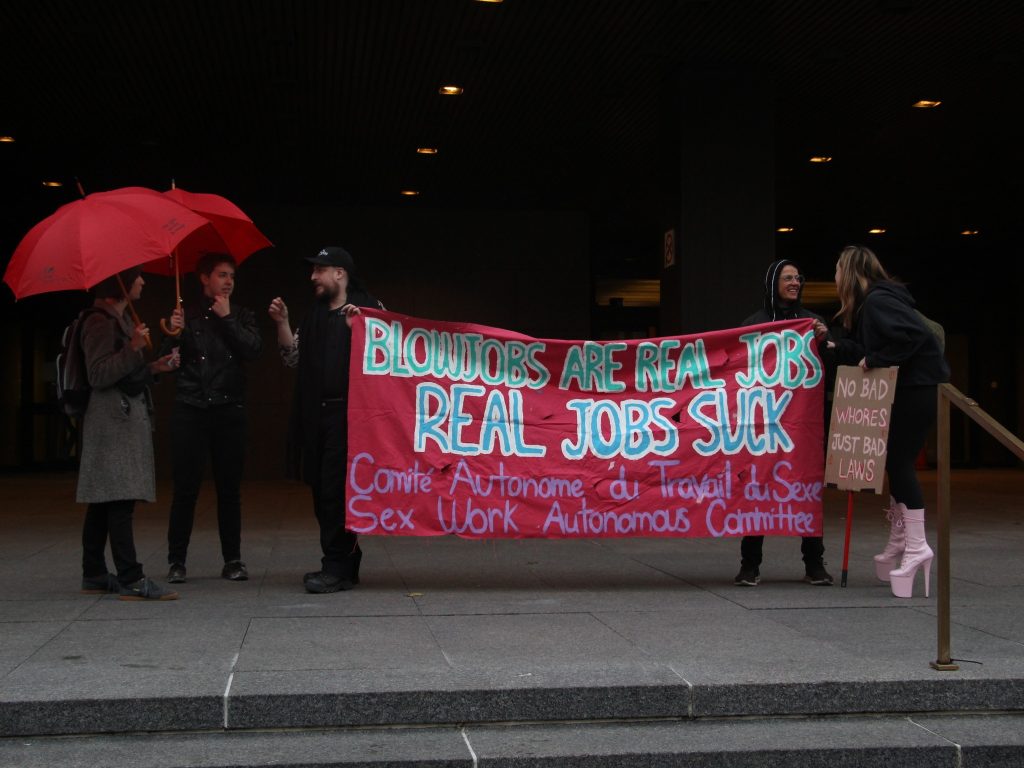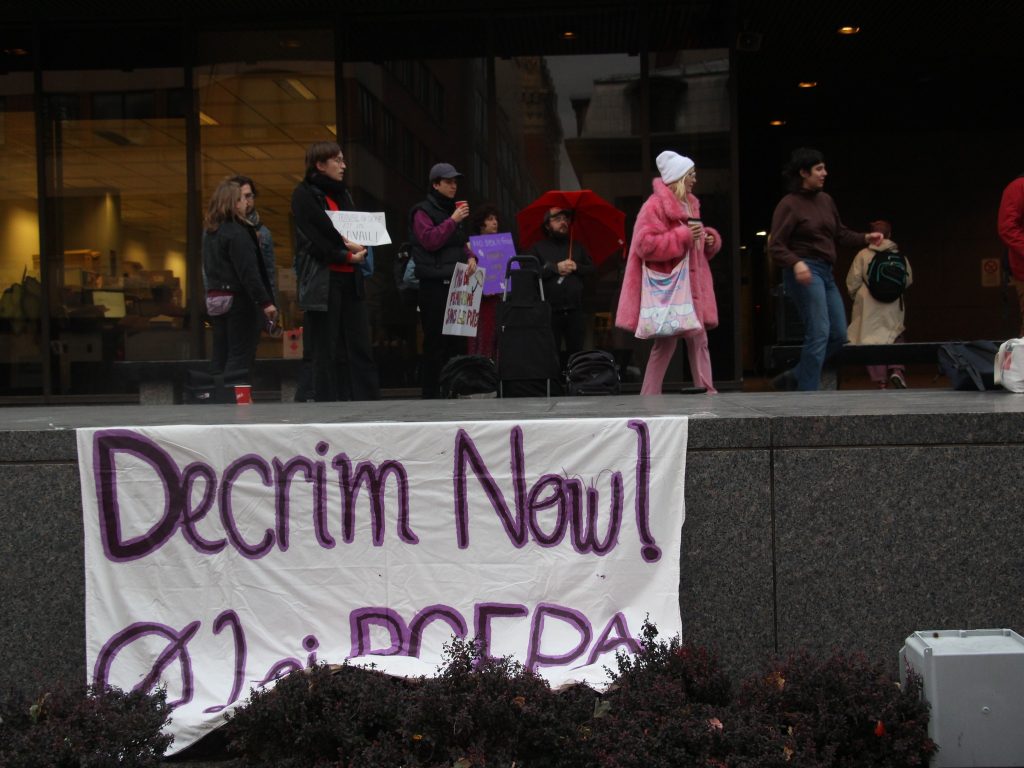Because Working is Playing the Whore!
Melina May and Adore Goldman
Translated by Mehrad Abad
In Quebec, several unions have historically taken anti-sex work stances and actively advocated for the criminalization of clients and third parties. Instead of showing solidarity with other workers fighting for better working conditions, these positions have perpetuated a class contempt, suggesting that we are victims to be saved rather than exploited workers, much like unionized workers.
Thus, the positions of several unions have not only undermined class solidarity but also solidarity among women: following a controversial stance on the agency of SWers during a General Assembly of the Fédération des femmes du Québec (FFQ) in 2018, the Confédération des Syndicats Nationaux (CSN), the Syndicat des professionnels du gouvernement du Québec (SPGQ), and the Syndicat de la fonction publique et parapublique du Québec (SFPQ) left the federation. Here, we aim to deconstruct the arguments of these groups suggesting that our struggles are individualistic and devoid of collective action within our movements.
And You, Have you Chosen your Work? The Question of Agency and Choice

A cornerstone of the arguments of unions against pro-sex work stances, like the one taken by FFQ, is the criticism of the concept of agency. According to the defectors from the federation, this stance promotes individualism and disregards systemic oppressive structures such as patriarchy, capitalism, and racism. We believe there are nuances to consider and elements to clarify for a worthwhile debate that includes us. as patriarchy, capitalism, and racism. We believe there are nuances to consider and elements to clarify for a worthwhile debate that includes us.
The questions of choice and agency are central here. The definition the FFQ presents of agency is as follows: “the ability of an individual to act upon the world, things, beings, to transform or influence them.”1We acknowledge that this definition is individualistic. However, asserting, as the CSN does, that “according to estimates, over 90% of prostitutes are coerced by poverty and violence into enduring sexual exploitation”2 apeals to pity and charitable sentiments rather than solidarity among workers.
It’s not surprising that some SWers claim to have chosen to work in the sex industry. After all, the primary condition of capitalism is that the worker is free to sell their labor power but lacks the means to independently realize their labor power (without a capitalist who owns the means of production)3.
These SWers aren’t wrong in asserting that they chose sex work, even though it was a set of circumstances that led them there. While these circumstances may sometimes be more or less constraining, for most, it represents the best or least bad option. Several reasons explain this: sex work enables many to earn more money in less time, with some flexibility in terms of scheduling. It can be started and stopped at any time and doesn’t require diplomas. These features are appealing, especially for single mothers, individuals with chronic illnesses, or disabilities preventing full-time employment. This work also allows many to return to education and later secure better-paid jobs.
However, for some, the possibilities are more limited. This is the case for migrants working in the sex industry. They face the most challenging conditions. Due to their precarious immigration status, employers have the leverage to blackmail and further exploit them, similar to their migrant colleagues in other industries like agriculture. However, the anti-prostitution argument completely ignores these individuals’ desire to migrate. For example, the CSN focuses solely on traffickers and pimps but remains silent about the role of the State and its immigration policies in these abject working conditions.
It’s also noteworthy that many SWers have another “civil” job that doesn’t provide enough income to sustain them through the month. Sex work then serves as supplementary income. This is also the case for several unionized workers. Among our colleagues, there are nurses, social workers, beneficiary attendants, community workers, public service employees, blue-collar workers, etc. By not supporting the struggle of SWers, unions not only demonstrate a lack of solidarity with other workers but also with a segment of their base.
Certainly, being free to choose to sell one’s labor power doesn’t mean we aren’t exploited! On the contrary, it’s a false choice since working is inevitable. Individually, we might choose our work, but we can’t choose not to work! Depending on the options available to us, we choose the least bad option. In this regard, we believe it’s fruitless to pose the question of choice or no choice. Because we must work, and our work is exploited and undermined by violence, we’d rather discuss organizational strategies to improve our living and working conditions!
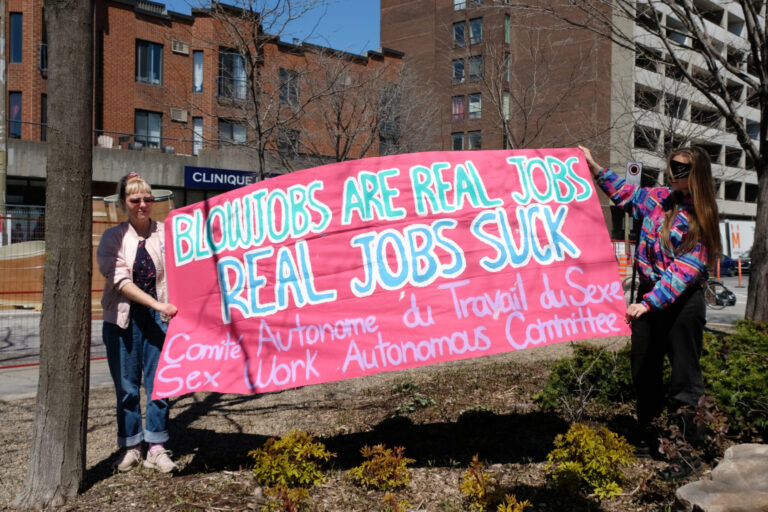
Don't Save Us, We've Got This! For Genuine Solidarity Among Workers!
Following the adoption of positions by the FFQ, the CSN lamented a departure from the federation’s values and interests: collective action would have been replaced by individual experiences. We don’t aim to defend the FFQ on this issue. It’s undeniable that collective action has been dwindling in the FFQ for several years, similar to many other community organizations. Additionally, it can’t be said that unions are a very prolific ground for struggle. The struggles and interests of workers are often paralyzed by bureaucracy and the management of major union bodies.
While the CSN “believes [collective action] remains the best way to defend the interests of everyone,”5 it nonetheless advocates for the criminalization of the sex industry as a savior, meaning police intervention rather than the struggle of workers. If there’s anything that hinders the collective organization of SWers and more broadly, community organization, it’s repression and surveillance!
It’s important to remember that the Nordic model advocated by the CSN and other unions has serious consequences for SWers and our ability to defend our rights and protect our integrity. The criminalization of clients means they’re generally reluctant to reveal their true identity, complicating the identification and reporting of dangerous clients.
In a system of criminalization, arrests, evictions, deportations of our migrant colleagues, the closure of our workplaces, and the absolution of our bosses from ensuring a safe and inclusive work environment are all means to undermine SWers’ organization. Furthermore, our initial attempts at workplace organization already face these concrete impacts: if we organize against our boss, there’s a risk the police will arrest them and close our workplace. Consequently, we’d all lose our jobs, and our migrant colleagues would be deported.
We don’t want your savior complex and appeals for more resources to get us out of the industry. What we need is genuine class solidarity. It’s high time for unions to stand on the side of the people they claim to defend. We are workers; we want labor rights; we want sick leave, parental leave, holidays; we want to be able to report abuses by our bosses and clients using the same mechanisms available to other workers.
The organization of SWers has never waited for the support of unions to operate, nor to create and strengthen ties with communities and allied groups. We know that the legal reforms we demand alone cannot fight against the structural violence SWers often face, being at the intersections of several forms of oppression. That’s why our collective strength is also at the core of other struggles, against the penal system, against borders, transphobia, sexist violence, colonialism, and against our general oppression. While the CSN worries “about the effects and repercussions of prostitution on all women,”6 we respond that our struggle is part of a more radical project, a class struggle, a struggle of women and genders, to reject the exploitative conditions that weigh on all of us.
Because working is playing the whore And playing the whore is working!
1. Translation from: “faculté d’action d’un être; sa capacité à agir sur le monde, les choses, les êtres, à les transformer ou à les influencer.” Confédération des syndicats nationaux. (2014). Document de réflexion sur l’adhésion de la Confédération des syndicats nationaux (CSN) à la Fédération des femmes du Québec (FFQ), p.5 from https://shorturl.at/gGPTX
2. Translation from: “selon les estimations, plus de 90% des prostituées sont contraintes par la misère et les violences à subir l’exploitation sexuelle.” Confédération des syndicats nationaux. (2014). La Prostitution, une pratique à dénoncer, une exploitation à combattre, p. 6, from https://shorturl.at/pu3c8
3.“For the conversion of his money into capital, therefore, the owner of money must meet in the market with the free labourer, free in the double sense, that as a free man he can dispose of his labour-power as his own commodity, and that on the other hand he has no other commodity for sale, is short of everything necessary for the realisation of his labour-power.” Karl Marx. (1867). “Chapter Six: The Buying and Selling of Labour-Power”, Capital, Volume 1, from https://tinyurl.com/lecapitalchap6
4. Confédération des syndicats nationaux. (2014). La Prostitution, une pratique à dénoncer, une exploitation à combattre, p.4-5, from https://shorturl.at/pu3c8
5. Translation from: “estime [que l’action collective] demeure la meilleure voie pour la défense des intérêts de toutes
et de tous.” Confédération des syndicats nationaux. (2014). Document de réflexion sur l’adhésion de la Confédération des syndicats nationaux (CSN) à la Fédération des femmes du Québec (FFQ), p.5 from https://shorturl.at/gGPTX
6. IDEM, p.7















